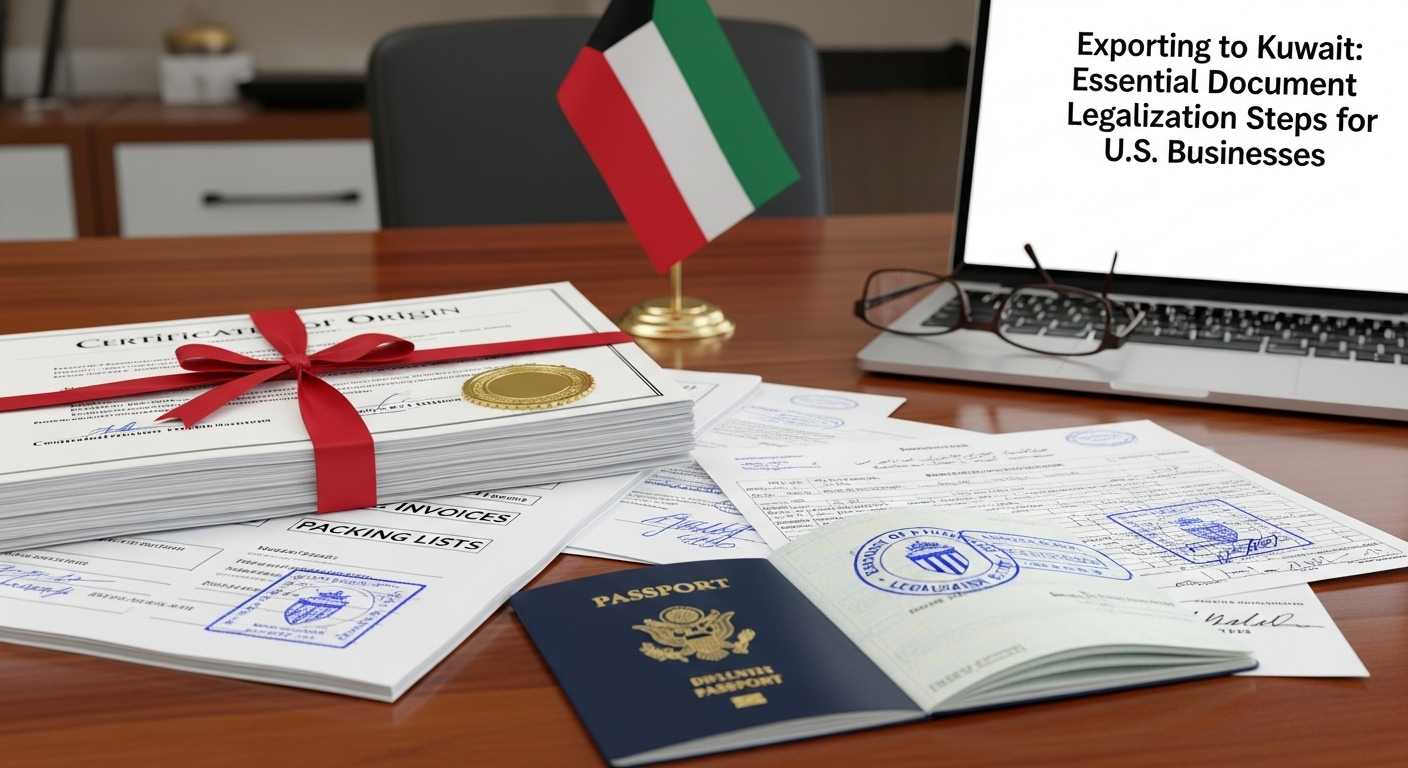
Exporting to Kuwait: Essential Document Legalization Steps for U.S. Businesses Introduction
When exporting goods from the United States to Kuwait, proper documentation is crucial for customs clearance and regulatory compliance. U.S. exporters must ensure that all commercial and shipping documents are authenticated and legalized before shipment. This process verifies the authenticity of U.S.-issued documents for use in Kuwait and ensures smooth trade transactions under Kuwaiti import regulations.
Why Document Legalization Is Required for Kuwait
The Government of Kuwait requires legalized documents to confirm their authenticity when presented to Kuwaiti authorities. Legalization serves as proof that U.S.-issued business and export documents are genuine, properly certified, and recognized by the Kuwait Embassy in Washington, D.C.
Without proper legalization, shipments can face customs delays, rejections, or additional verification steps that may affect delivery timelines and trade operations.
Common Export Documents Requiring Legalization
Before exporting goods to Kuwait, ensure the following documents are properly certified and legalized:
| Document Type | Purpose |
|---|---|
| Commercial Invoice | Details the transaction between the buyer and seller, including price, product description, and terms of sale. |
| Certificate of Origin | Certifies that the products are manufactured or produced in the United States. |
| Packing List | Provides detailed packaging and quantity information for customs clearance. |
| Bill of Lading / Air Waybill | Serves as proof of shipment and transport arrangements. |
| Quality Certificates (if applicable) | Confirms product quality, compliance, or conformity, especially for food, health, or industrial goods. |
| Free Sale Certificate | Confirms that the product is legally sold in the U.S. market. |
| Power of Attorney (if required) | Authorizes a local representative or agent in Kuwait to act on behalf of the U.S. exporter. |
Step-by-Step Legalization Process for Export Documents to Kuwait
To ensure your documents are accepted by Kuwaiti authorities, follow these legalization steps carefully:
-
Notarization (if applicable)
-
Business or company documents may need to be notarized by a U.S. Notary Public to verify the signature and identity of the signer.
-
-
State Certification (if issued by a state authority)
-
Documents originating from a U.S. state (e.g., Certificates of Incorporation) must first be certified by the Secretary of State office.
-
-
U.S. Department of State Authentication
-
After state certification, documents are authenticated by the U.S. Department of State to confirm the legitimacy of the previous signatures and seals.
-
-
Kuwait Embassy Legalization
-
The final step is legalization by the Embassy of Kuwait in Washington, D.C., which certifies that the document is valid for use in Kuwait.
-
Timeline and Processing
-
Standard processing: 11 business days
-
Expedited services: Available through authorized document legalization providers for faster turnaround.
Pro Tips for U.S. Exporters
-
Ensure all documents are consistent in company name, address, and product details.
-
Use original signatures and seals whenever possible to avoid rejections.
-
Verify the latest Kuwait import regulations before shipment, as requirements may vary by industry.
-
Keep digital copies of all legalized documents for internal records and compliance purposes.
